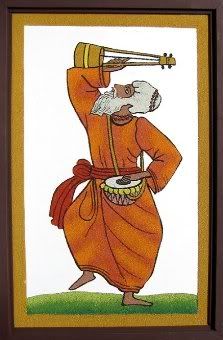
Bauls croon from their hearts and pour out their feelings and emotions in their songs. But they never bother to write down their songs. Theirs is essentially an oral tradition, and it is said of Lalan Fakir (1774-1890), the greatest of all Bauls, that he continued to compose and sing songs for decades without ever stopping to correct them or put them on paper. It was only after his death that people thought of collecting and compiling his rich repertoire. Even today, most Bauls live in small huts. They live in couples but are not supposed to have children, mostly they adopt abandoned children to whom they teach everything they know. Twice a week, they go to villages to collect food, mostly rice and vegetables. The verses of Baul poetry can come from past or present composers, and they always include sacred teachings related to righteous practice and life style.
Purna Das Baul - Aay Dekhe Ja Tora :
Purna Das Baul - Agun Pani :

Hare Krishna Das - Jaaliey Geley Moner Aagoon :
Shuddhananda Das Baul - Moner Katha Bolibar :
The living space of Bauls is called Akhara. It is similar to an Ashram, with the difference that men and women live together, considering each other as spiritual partners. Each year, Bauls organise a big meeting where they exchange songs, experiences and spiritual teachings. Among the contemporary Baul singers, the names of Purna Das Baul, Jatin Das Baul, Biswanath Das Baul, Paban Das Baul and Bapi Das Baul are prominent. Purna Das Baul is undisputedly the reigning king of the Baul community today.
.. more Street Music of India »



No comments:
Post a Comment